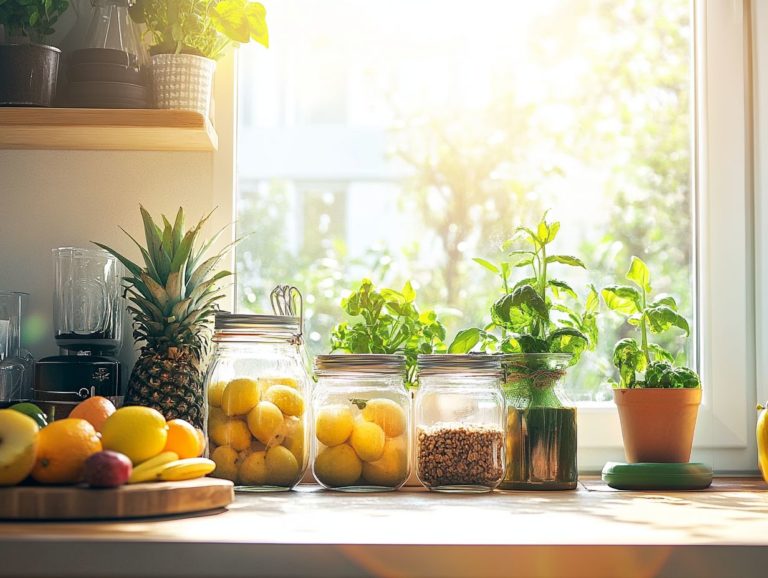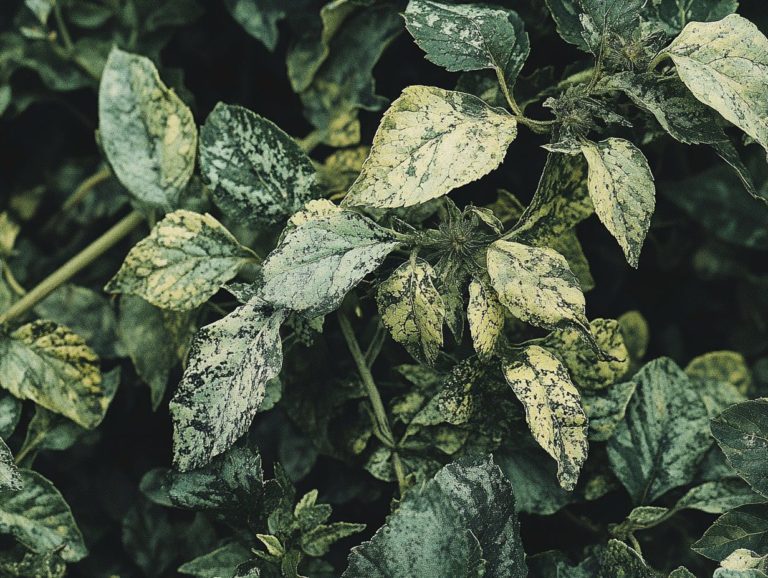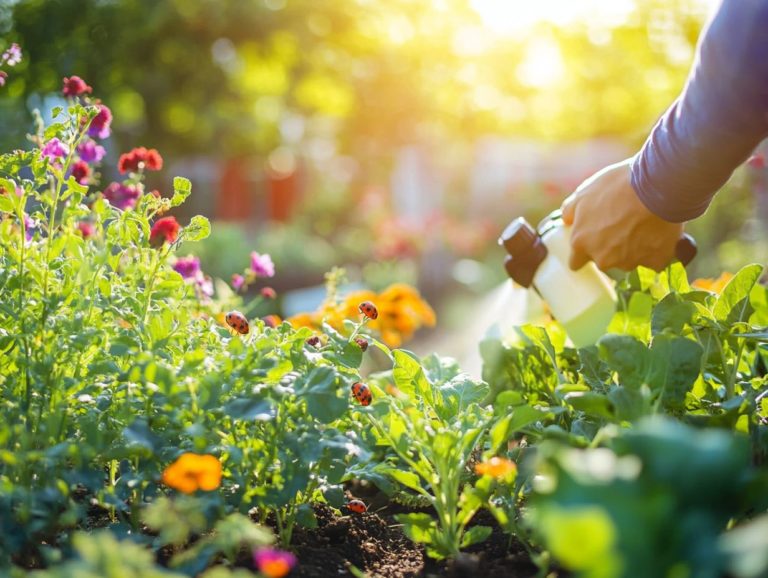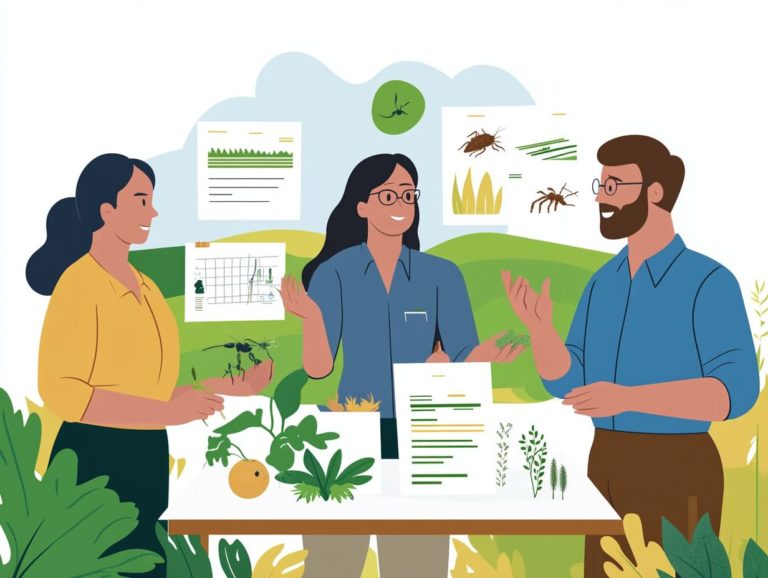Using Companion Gardening to Control Aphids
Companion gardening is a time-honored technique that pairs plants to enhance growth, deter pests, and foster a vibrant garden ecosystem.
This article delves into the advantages of companion gardening, especially when it comes to managing those pesky aphid infestations. You ll learn to identify these troublesome insects, understand the damage they inflict, and discover effective companion plants that either repel aphids or attract their natural predators.
With practical strategies for implementing companion gardening techniques, you ll be well-prepared to cultivate a flourishing, pest-resistant garden.
Contents
- Key Takeaways:
- Benefits of Companion Gardening
- Identifying and Understanding Aphids
- Companion Plants that Repel Aphids
- Companion Plants that Attract Aphid Predators
- Implementing Companion Gardening Techniques
- Frequently Asked Questions
- How can using companion gardening help control aphids in my garden?
- What are some examples of companion plants that can help control aphids?
- Can I use companion gardening to control aphids in all types of gardens?
- How close should I plant my companion plants to my other plants to control aphids?
- Are there any other benefits to using companion gardening besides controlling aphids?
- Can I use companion gardening as the sole method to control aphids in my garden?
Key Takeaways:
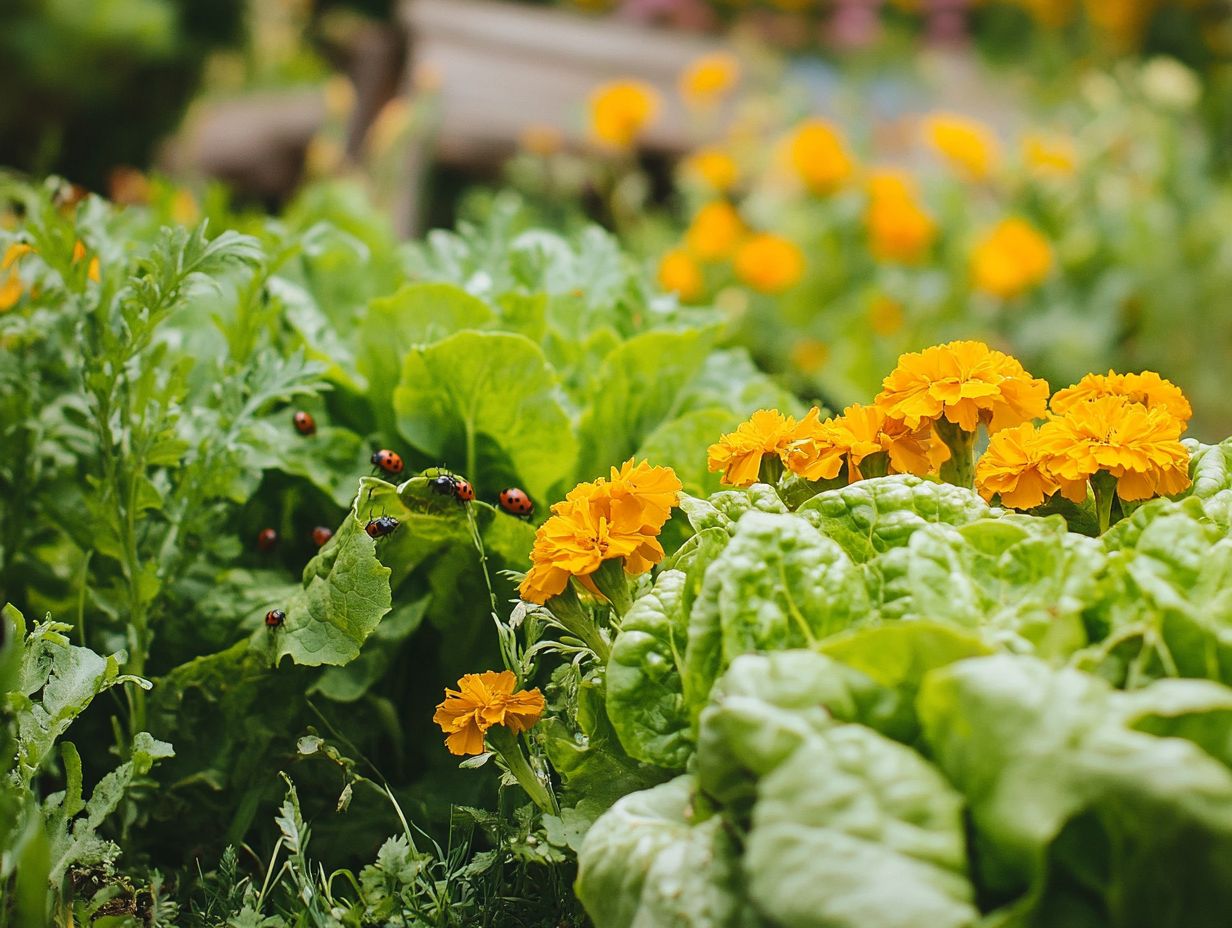
- Companion gardening is a natural and effective way to control aphids in your garden.
- Selecting companion plants that repel aphids and attract their predators can help keep aphid populations under control.
- Implementing companion gardening techniques, such as interplanting and crop rotation, can lead to healthier plants and increased yields while reducing the need for pesticides.
What is Companion Gardening?
Companion gardening involves arranging different plant species to help them grow better. This method can deter pests and enhance biodiversity.
By thoughtfully choosing companion plants, you can cultivate an environment where plants actively support one another, resulting in superior yields and healthier crops. For example, pairing marigolds with your vegetables can naturally repel aphids, while herbs like basil can boost both the flavor and growth rate of your tomatoes.
This method maximizes your garden space. It also reduces the need for chemical pesticides, promoting eco-friendly gardening.
Beyond pest management, companion gardening enriches the soil by adding nitrogen, which is essential for plant growth, using plants like clover. This contributes to a more resilient and self-sustaining landscape.
Benefits of Companion Gardening
The benefits of companion gardening are abundant, offering you healthier plants, increased yields, and effective pest management strategies.
By incorporating companion plants into your garden, you can naturally repel aphids and their colonies while simultaneously attracting beneficial insects like ladybugs and green lacewings, which help keep those pesky aphid populations in check.
This approach boosts your plants’ growth and creates a lively ecosystem, making companion gardening a critical practice for both novice and seasoned horticulturists alike, especially in community gardens.
Natural Pest Control
Using nature to keep pests away is an essential element of companion gardening, allowing you to employ strategies that harness plant relationships to deter pests without resorting to synthetic pesticides. Techniques such as utilizing trap plants and incorporating strong-smelling herbs can effectively repel aphids and other unwanted insects, creating an environment that encourages beneficial predators.
By introducing flowering plants like marigolds or nasturtiums, you can attract helpful insects such as ladybugs and lacewings, which thrive on aphids. Incorporating aromatic herbs like rosemary or basil can create a fragrant barrier that further discourages these pests.
Understanding the intricate relationships between various plant species is crucial, as it enhances biodiversity and bolsters the resilience of your garden ecosystem.
This harmonious planting leads to a flourishing environment where each element plays a role in natural pest control, ultimately resulting in healthier plants and bountiful harvests.
Better Plant Growth and Yield
Companion gardening helps you manage pests effectively and enhances plant growth and yield through thoughtful plant pairings. By selecting supportive companion plants, you can boost how plants absorb nutrients and address deficiencies. This results in healthier crops and bountiful harvests.
Incorporating organic solutions and beneficial plants fosters a thriving garden ecosystem, promoting robust growth and vibrant produce.
This harmonious relationship among plants arises from their unique interactions. Certain species provide shade, support, or even attract beneficial insects, creating a more resilient environment for growth.
Take, for example, the pairing of legumes and leafy greens: the legumes fix nitrogen in the soil, enriching it for the leafy greens to flourish. Meanwhile, deep-rooted plants break up compacted soil, improving aeration and giving shallower roots better access to nutrients.
These collaborations lead to superior crop yields and enhance soil health over time. Companion gardening is a strategic choice for sustainable agriculture and effective pest control methods.
Identifying and Understanding Aphids
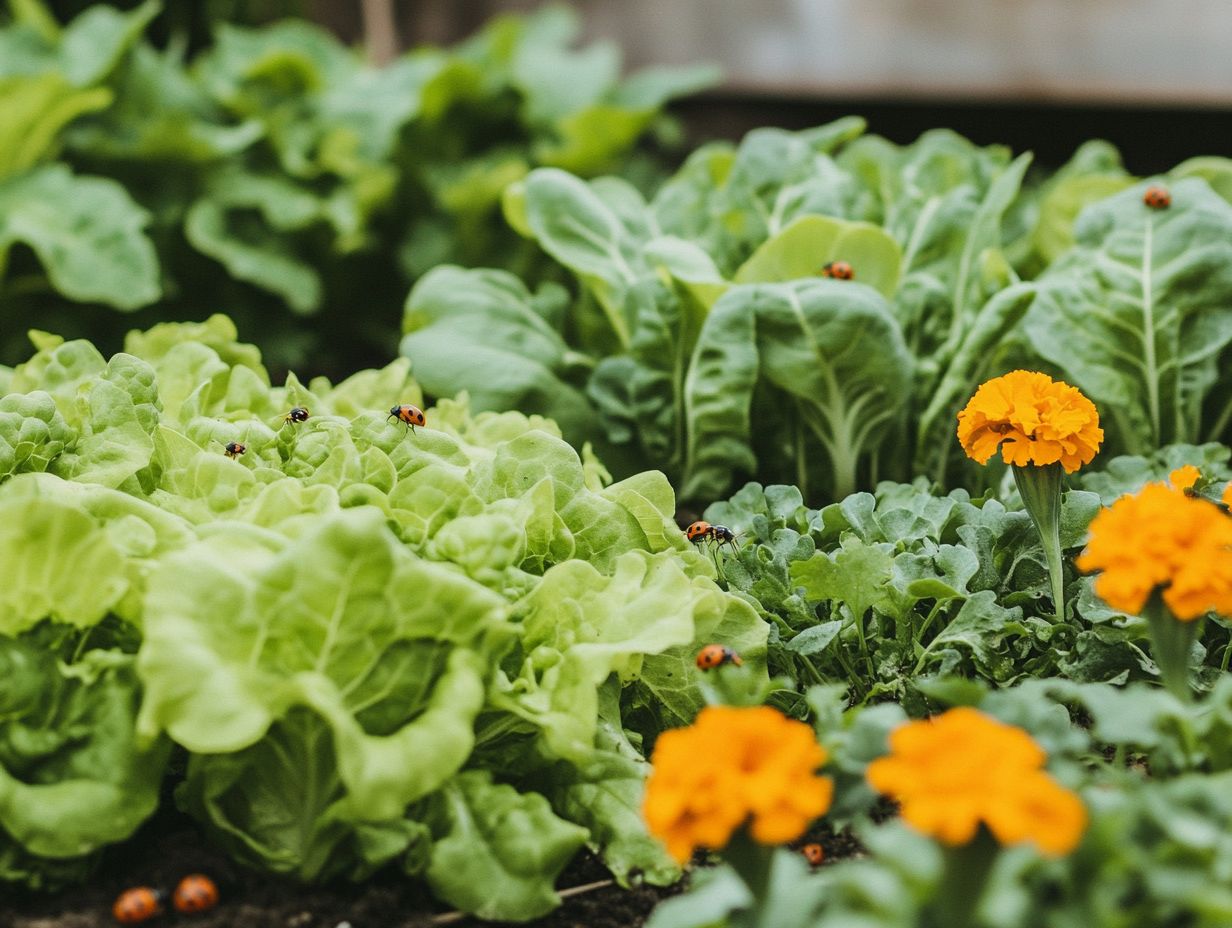
Identify and understand aphids now to protect your garden! These tiny insects can cause significant damage to many plants. Common species include green peach aphids and black bean aphids, each with unique physical traits that make identification easy.
Their presence can signal nutrient deficiencies and, if left unchecked, lead to severe harm. Recognizing the signs of an aphid infestation is crucial for taking timely action to keep your plants healthy and vibrant.
Physical Characteristics
Aphids are small, soft-bodied insects that come in a spectrum of colors from green to black. They measure between 1-10 mm in length, with long antennae and a characteristic pear-shaped body. One notable attribute is their ability to excrete a sticky substance known as honeydew. This can lead to black sooty mold on plants, making it crucial to identify these pests in your pest management efforts.
These creatures can display a variety of hues, including purple, yellow, and even light brown. Some aphids are covered in a waxy coating, giving them a fuzzy or ‘cottony’ appearance. The presence of cornicles (small, tube-like structures on their bodies) helps differentiate between species.
Aphids produce honeydew, attracting other pests like ants and encouraging harmful fungi, increasing the risk to your crops. By understanding these physical traits and behaviors, you’ll enhance your ability to recognize and effectively manage aphid populations.
Damages Caused by Aphids
Aphids wreak havoc on your plants, significantly affecting their health and productivity with their sap-sucking ways. These pests draw vital nutrients from your plants, leading to stunted growth, yellowing leaves, and reduced yields.
The honeydew they excrete fosters the growth of black sooty mold, which undermines plant vitality and creates an inviting environment for aphid colonies to flourish.
This unsightly mold detracts from the visual appeal of your plants and obstructs sunlight, hindering photosynthesis and intensifying damage to plant health. Aphids attract many other pests and diseases, piling on stress for your plants.
You may notice physiological effects manifesting as nutrient deficiencies, as sap loss disrupts the essential flow of minerals and nutrients.
As a result, your plants overall resilience diminishes, leaving them vulnerable to environmental stressors and pathogens. This chain reaction can lead to a downward spiral in growth and production, making it crucial to address the aphid issue promptly to safeguard your botanical investments.
Don t wait! Start identifying aphids today to keep your garden thriving!
Companion Plants that Repel Aphids
Certain companion plants are incredibly effective at repelling aphids, making them invaluable allies in your pest management efforts.
For instance, marigolds, catnip, and garlic emit strong aromas that aphids find unappealing. This helps to significantly reduce their numbers and aids in aphid reduction.
By integrating these trap plants into your gardening strategies, you not only safeguard your crops but also contribute to a healthier, more balanced ecosystem through mixed culture.
Herbs and Flowers
Herbs and flowers are important for companion gardening, especially when it comes to keeping aphids and other pests at bay.
These natural allies not only elevate the visual charm of your garden but also help cultivate a balanced ecosystem. Take basil; its potent aroma keeps aphids away and encourages healthy growth in surrounding plants. The robust scent of rosemary also effectively deters a range of pests.
Flowers like zinnias and yarrow, brimming with nectar, serve as a feast for ladybugs and lacewings your garden’s very own aphid hunters. By diversifying your planting strategy with these beneficial herbs and flowers, you can reduce pest infestations while fostering a vibrant habitat that supports the entire garden ecosystem.
Vegetables and Fruits
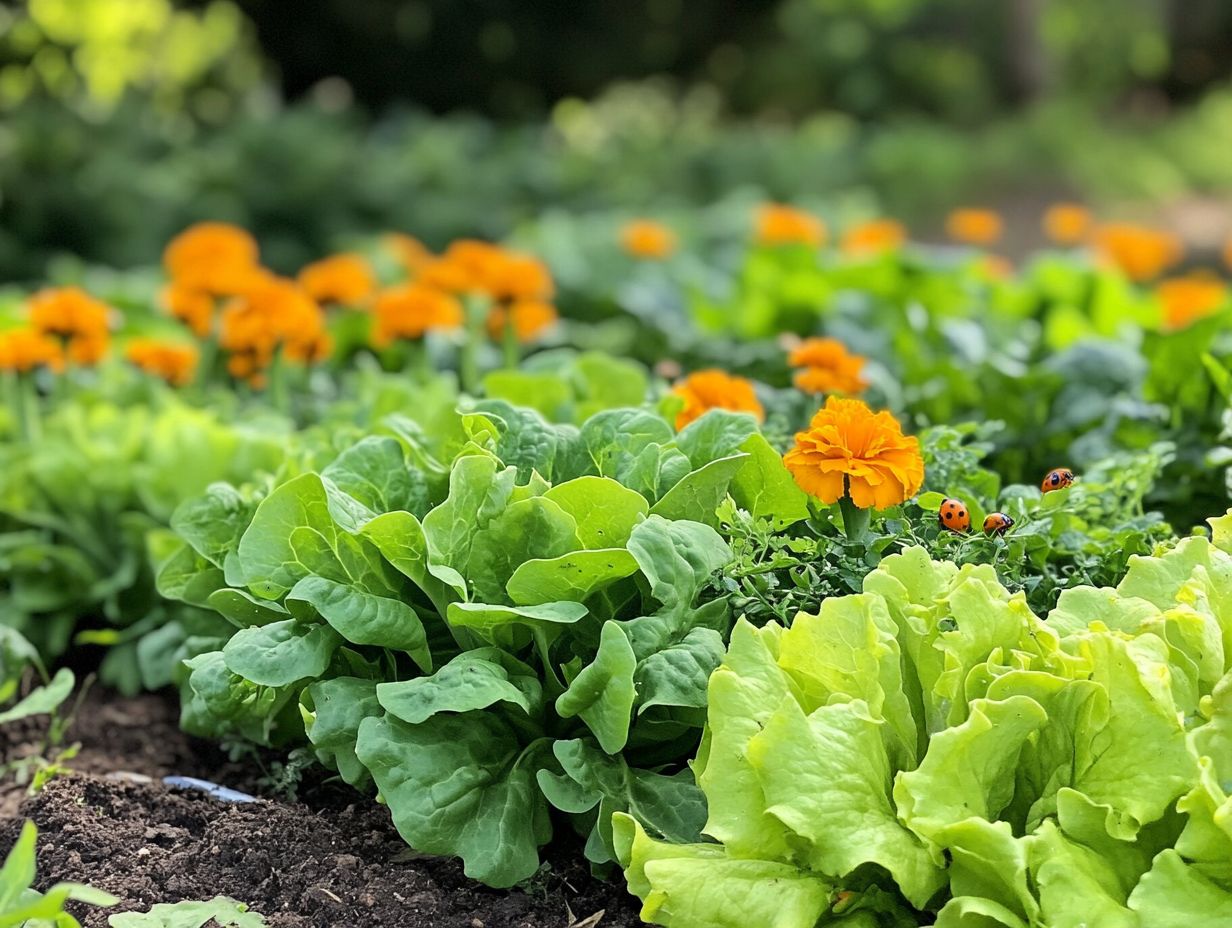
Along with herbs and flowers, certain vegetables and fruits can effectively repel aphids, making them key players in your companion planting strategies.
For instance, planting garlic and sunflowers alongside your crops keeps those pesky aphids at bay while attracting beneficial insects that work in your favor. By choosing aphid-resistant varieties and understanding plant relationships, you can elevate your pest management efforts and boost your yields.
Take tomatoes; they thrive when paired with marigolds, as these vibrant flowers release compounds unappealing to aphids. You can also position onions and chives strategically near softer vegetables like lettuce or cabbage to create a protective barrier against these pests. Even fruits like strawberries benefit from the company of borage, which repels aphids and enhances the overall health of neighboring plants.
By employing these specific combinations, you can cultivate a harmonious garden ecosystem that deters common pests while promoting growth and vitality.
Companion Plants that Attract Aphid Predators
Companion plants that attract aphid predators are vital for fostering a balanced ecosystem in your garden. Incorporating plants like dill, coriander, and yarrow entices beneficial insects such as ladybugs and green lacewings, which naturally keep aphid populations in check.
This method minimizes your dependence on synthetic pesticides and creates a lively garden.
Insects and Birds to Encourage
Encouraging specific insects and birds in your garden can significantly enhance your pest control efforts, especially against aphid infestations.
Insects like ladybugs and green lacewings are renowned for their appetite for aphids, and they can substantially reduce pest populations. Birds such as chickadees and wrens contribute by feasting on these pesky colonies. Therefore, creating an environment that attracts these beneficial species is essential.
You can incorporate a variety of flowering plants, native shrubs, and herbs into your landscape to provide vital habitats that draw in these helpful creatures. For example, planting marigolds or dill can entice ladybugs, while offering nesting sites in hedges can welcome insect-eating birds.
It s wise to avoid pesticides, as these chemicals can inadvertently harm the allies you rely on for pest control. Maintaining a diverse garden not only aids in the battle against aphids but also fosters overall biodiversity, contributing to a balanced ecosystem where beneficial insects and birds can truly thrive.
Implementing Companion Gardening Techniques
Implementing companion gardening techniques requires careful planning and knowledge of plant relationships to maximize benefits in pest management and crop yield.
By embracing practices like planting different types of plants together, optimal plant spacing, and the strategic use of trap plants, you can cultivate an environment that significantly reduces aphid populations while nurturing beneficial insects.
These clever gardening strategies can transform your garden! They not only bolster the health of your plants but also champion a sustainable approach to gardening.
Strategies for Success
Adopting effective strategies for success in companion gardening can elevate your pest control and enhance plant health. By utilizing organic solutions, understanding the environmental factors that influence plant growth, and selecting the right companion plants, you set the foundation for a thriving garden.
Integrating these elements allows you to manage aphids effectively and boost your garden’s overall productivity.
It s crucial to explore the specific relationships between plants. Certain pairings can deter harmful insects or attract beneficial ones. For example, interplanting marigolds with your vegetables not only adds beauty to your garden but also naturally repels nematodes and aphids.
Prioritizing soil health through practices like composting and crop rotation will further strengthen your plants against pests.
Act now to embrace natural solutions such as neem oil or insecticidal soaps! These methods can tackle pest issues while being gentle on the ecosystem, ensuring that your garden thrives, fosters biodiversity, and champions sustainability.
Frequently Asked Questions
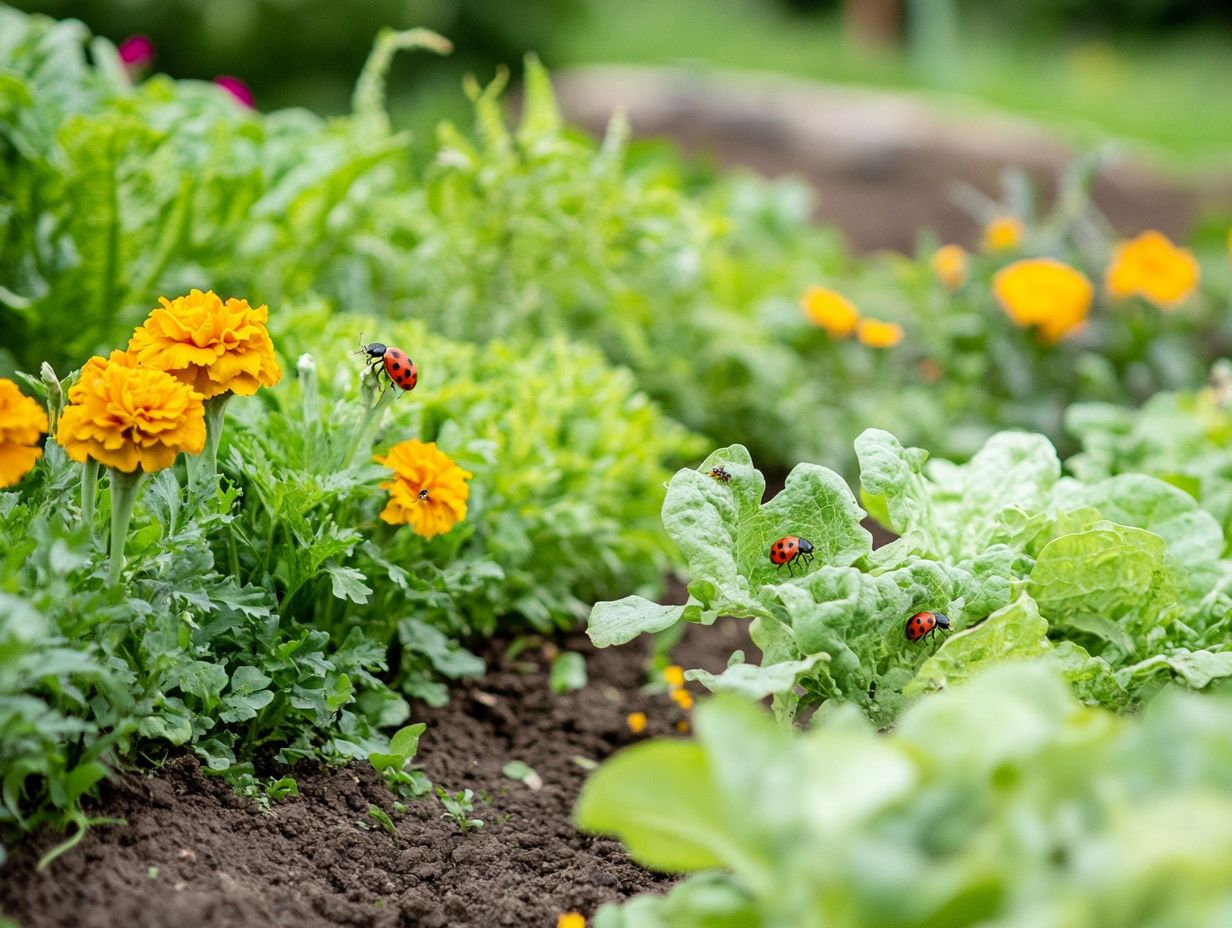
How can using companion gardening help control aphids in my garden?
Companion gardening involves planting certain plants next to each other to benefit one or both. For example, marigolds can repel aphids and protect your other plants from infestation.
What are some examples of companion plants that can help control aphids?
Common companion plants to control aphids include marigolds, garlic, chives, and basil. These plants emit strong scents that repel aphids and attract beneficial insects that prey on them.
Can I use companion gardening to control aphids in all types of gardens?
Yes, companion gardening can be applied in all types of gardens, including vegetable gardens, flower gardens, and even indoor gardens. It is a natural and safe method to control aphids without harmful chemicals.
How close should I plant my companion plants to my other plants to control aphids?
It is recommended to plant companion plants within a few feet of your other plants to achieve the best effect on controlling aphids. Different plants may have varying effects, so it’s best to research and plan accordingly.
Are there any other benefits to using companion gardening besides controlling aphids?
Companion gardening can also improve soil quality, attract pollinators, and increase overall plant health. It is a sustainable and holistic approach to gardening that benefits your entire garden ecosystem.
Can I use companion gardening as the sole method to control aphids in my garden?
While companion gardening can effectively control aphids, it is recommended to use it in conjunction with other pest control methods, such as handpicking, natural sprays, and beneficial insects. This comprehensive approach can help manage aphids in your garden.
Start companion gardening today for the best results!

